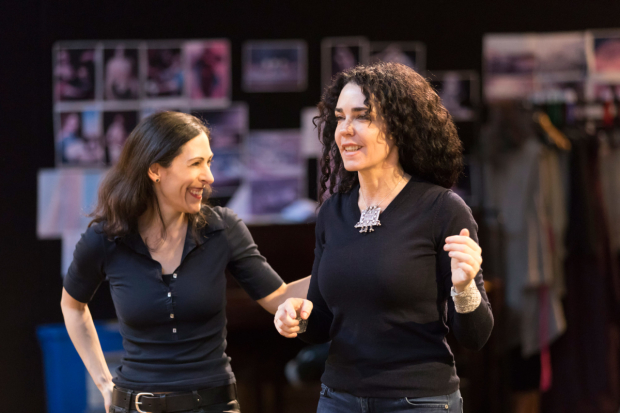Review: Salomé (National Theatre)
Bring me the head of Yaël Farber, and, while you’re at it, a side dish of whosoever commissioned this dross. There is nothing worse than theatre that makes its audience feel stupid. The South African director’s own version of the biblical myth – a feminist reclamation – is so confounding that it might as well be written entirely in Aramaic.
For starters, Farber’s version presumes prior knowledge of Salomé’s story. For those unfamiliar with biblical lore and the full canon of Oscar Wilde, Salomé was the woman who demanded John the Baptist’s bonce on a plate. She’s a contested figure – nameless and unknowable – and her story changes with every telling. The evangelists disagree. Artists use her for their own ends. Sometimes she dances a seductive dance before placing her order. Sometimes she asks on her mother’s behalf. Sometimes, as in Wilde’s version, she takes a fancy to John and, having been spurned, ends up snogging his noggin. Out of all that, Salomé
emerges as a symbol of seduction – a femme fatale who leads men into temptation and evil.
Farber, ultimately, reframes her as a revolutionary. Rather than a repellent request, her key demand becomes an act of collusion with John the Baptist – a way of martyring him to trigger revolution against the Roman Empire and its acolytes. That, I’d argue, is every bit as arbitrary as any notion of her villainy. It’s revisionism for the sake of revisionism – one big ‘What if…’
For the most part though, Farber’s not really bothered by Salomé’s story. She’s more interested in the uncertainty around it. How, her version wonders, did this nameless young woman’s history become so contested? How does the image of her – dancing and demanding death – come to bear?
Farber’s answer is that Pontius Pilate’s occupying Roman army force the local population – both Paul Chahidi’s King Herod and the Sanhedrin leaders (Philip Arditti and Raad Rawi) – into submission. The Arabic-speaking Iokanaan the Zealot (Ramzi Choukair) is a would-be agitator, and as Salomé So-Called (yep, I kid you not), Isabella Nefar floats silently through the first half, a hostage to her own story. She’s torn at by crowds and tortured in prison and, newly baptized, brought up to dance nude for the leaders of the occupation.
Not only is the narrative itself obscured ("It begins at the end," says Olwen Fouéré’s flaxen-haired narrator helpfully), it’s delivered in a poetry so stewed, it comes out as a sludge. Line after line sounds lovely, but means next to nothing. "She is the image of silver," somebody purrs. "Her saliva is the source of my life," oozes Herod. "Take us beyond language." Well, quite.
The staging is impressive: elemental and spare. Susan Hilferty’s design works with images of erasure and ephemerality: screens of sand, clouds of smoke, bodies blurred beneath cellophane sheets. Tim Lutkin’s lighting bleaches people out and swallows them whole, while movement and song – Ami Shulman’s choreography like slow-mo shamanism and Adam Cork’s soaring Arabian wails – create atmosphere without leaving anything behind.
It’s elegant and intelligent, but that’s all for nothing when a show so neglects its audience. First and foremost, it’s frustrating and, once we feel shut out by a staging, we see straight through it. Mostly, therefore the impression is of great actors wasted. Lloyd Hutchinson and Chahidi – both gifts to directors – mostly have to walk very slowly and speak in sing-song-bible-speak. Everyone’s dressed in generic biblical chic, but blink and it all looks a bit Battlestar Galactica. The stage slowly rotates, the action grinds on, the poetry spools. Best forgotten.
Salomé runs at the National Theatre until 15 July.











